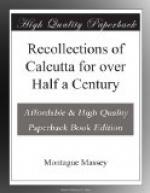it reel and tremble from top to bottom. I recollect
I was not feeling at all nervous, not realising at
the time the very great danger that threatened us
all. But one of my chums, a little stout man,
well known at that time in the tea trade, of the name
of Inskipp, usually a most cheery and genial soul,
tried his best to instil into our minds the very serious
risk we were running. He kept roaming about the
room in a very distressed and restless manner, prophesying
all sorts of disasters, winding up with the assertion
that it would not at all surprise him if at any moment
the house were to tumble down about our ears and bury
the whole lot of us in its ruins. It was, however,
all of no use. He could not succeed in frightening
us; and the four of us continued to play whist, and
now and then threw out at him a few chaffing remains
on his lugubrious and unhappy state. But later
on we had a tremendous shock, and for the moment it
seemed as if part of his prognostications were to
come only too true. It appeared that the iron
bar across one of the windows in my bedroom to the
west, looking on to the river, leading oft the sitting
room in which we were seated, had given way, and the
wind bursting through the closely-barred shutters
with irresistible fury had forced open the door of
communication between the two rooms. Most fortunately
the shutters held or the whole flat would have been
completely wrecked. It took all our combined
efforts some time to force back the door and securely-fasten
it by jamming a music stool and chairs up against
it. To add to our discomfort, the roof was leaking
like a sieve, and we had to place several bowls in
each of the rooms, and my own room when I entered it
the following morning when the storm had passed was
a sight more easily imagined than described.
Of course I had to find beds for all my guests, but
it is needless to say that none of us got much sleep.
When daylight at length broke we all rushed to the
windows, naturally expecting to see the same sort
of debacle amongst the shipping as had overtaken it
in the cyclone of 1864; but, to our intense joy and
relief, not a single vessel had left her anchorage.
This was partly due to the port authorities having
learnt by bitter experience the necessity of considerably
strengthening and improving the moorings, and also
in a great measure to the absence of the storm-wave
which had accompanied the previous cyclone and wrought
such havoc and destruction. But all the same
the loss of life and damage sustained, covering a
large extent of country, must have been of serious
and far-reaching magnitude. The city again suffered
heavily in the matter of trees and shrubs, which were
uprooted and, last of all, the crows of course contributed
their usual heavy toll of death and temporary annihilation.




